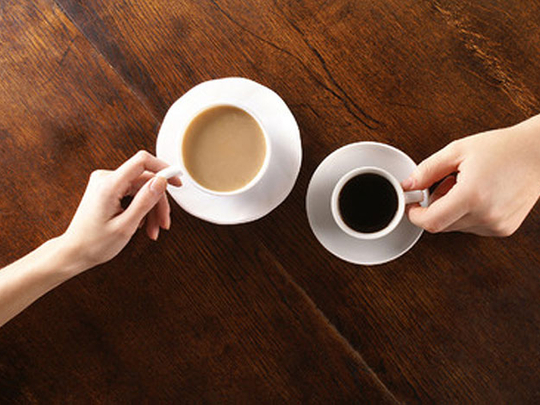
Dubai: When it comes to their healthiness, popular belief seems to label tea and coffee as the angel and devil of caffeine carriers – tea virtuous and soothing, coffee debauched and bold. However, the two beverages are far more evenly matched than is widely appreciated. Both brim with antioxidants, needed to help prevent a range of diseases including many cancers. Additionally, two or three cups of either brew daily do not constitute excessive caffeine intake: the Mayo Clinic defines heavy caffeine use as over 500mg per day, and two cups of coffee contain only 190mg of caffeine, while the same amount of tea has 95mg. So if both are essentially good for us, which one has the edge?
Shrink fats
If weight loss is the goal, it seems tea is the more effective potion, particularly the green variety. Green tea contains ECGC, an antioxidant that, along with boosting white blood cells that prevent viruses from reactivating, can also help to shrink fat cells and enhance the activity of muscle cells, according to an American Journal of Clinical Nutrition review. That is not to say that coffee cannot play an important part in weight loss too. The higher caffeine content can be channelled into exercise, and studies show people increase their energy exertion after a pre-workout cuppa, thereby burning more calories. It is true that coffee does have a higher propensity for weight gain than tea, simply because of its versatile taste, which is exploited in decadent drinks such as Frappuccinos, mochas and iced coffees. But provided we take a purist approach to the consumption of the beverage, it seems the difference between tea and coffee in the realm of weight loss assistance is minimal.
Both drinks are neck-and-neck when it comes to their role in bolstering immunity. A 2009 study published in the Archives of Internal Medicine found that coffee drinkers were 30 per cent less at risk of contracting type 2 diabetes (suffered by an alarming number in the UAE) than non-drinkers. The bean extract is also considered to be the top supplier of antioxidants in the American diet. Nevertheless, tea, the second most popular drink in the world after water, does wonders for the immune system: a Harvard University study discovered that the immune cells of people who drink tea in the morning respond to germs five times faster than those of coffee drinkers.
Perhaps the clearest difference in the healthiness of tea and coffee is in the dental health category. While coffee is known to cause tooth discolouration, a cup of black tea contains a considerable quantity of fluoride, which helps prevent tooth decay.
Overall, perhaps the angel/devil complex attached to tea and coffee is not completely unfounded. However, this is no reason to ditch the java for the chai. If coffee is a regular part of your diet, you don’t drink excessive amounts (over four cups a day) and a Frappuccino is a rare treat, the health benefits of the beverage are enough to keep you enjoying the brew guilt-free.
The writer is an intern at XPRESS


